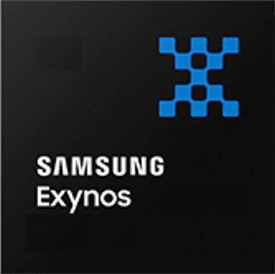
Samsung Exynos 1380 Benchmark, Test and specs
Last updated:
The Samsung Exynos 1380 has 8 cores with 8 threads and is based on the 7. gen of the Samsung Exynos series. The processor was released in Q1/2023. The Samsung Exynos 1380 scores 780 points in the Geekbench 5 single-core benchmark. In the Geekbench 5 multi-core benchmark, the result is 2,841 points.

| Name: | Samsung Exynos 1380 |
|---|---|
| Family: | Samsung Exynos (46) |
| CPU group: | Samsung Exynos 13xx (2) |
| Architecture: | Cortex-A78/-A55 |
| Segment: | Mobile |
| Generation: | 7 |
| Predecessor: | -- |
| Successor: | -- |
CPU Cores and Base Frequency
The Samsung Exynos 1380 has 8 CPU cores and can calculate 8 threads in parallel. The clock frequency of the Samsung Exynos 1380 is 2.40 GHz. The number of CPU cores greatly affects the speed of the processor and is an important performance indicator.
| CPU Cores / Threads: | 8 / 8 |
|---|---|
| Core architecture: | hybrid (big.LITTLE) |
| A-Core: | 4x Cortex-A78 |
| B-Core: | 4x Cortex-A55 |
| Hyperthreading / SMT: | No |
|---|---|
| Overclocking: | No |
| A-Core Frequency: | 2.40 GHz |
| B-Core Frequency: | 2.00 GHz |
Internal Graphics
The Samsung Exynos 1380 has integrated graphics, called iGPU for short. Specifically, the Samsung Exynos 1380 uses the ARM Mali-G68 MP5, which has 80 texture shaders and 5 execution units. The iGPU uses the system's main memory as graphics memory and sits on the processor's die.
| GPU name: | ARM Mali-G68 MP5 |
|---|---|
| GPU frequency: | 0.95 GHz |
| GPU (Turbo): | No turbo |
| Compute units: | 5 |
| Shader: | 80 |
| Hardware Raytracing: | No |
| Release date: | Q2/2020 |
| Max. displays: | 1 |
|---|---|
| Generation: | Vallhall 2 |
| Direct X: | 12 |
| Technology: | 6 nm |
| Max. GPU Memory: | -- |
| Frame Generation: | No |
Hardware codec support
A photo or video codec that is accelerated in hardware can greatly accelerate the working speed of a processor and extend the battery life of notebooks or smartphones when playing videos.
| h265 / HEVC (8 bit): | Decode / Encode |
|---|---|
| h265 / HEVC (10 bit): | Decode / Encode |
| h264: | Decode / Encode |
| VP8: | Decode / Encode |
| VP9: | Decode / Encode |
| AV1: | Decode |
|---|---|
| AVC: | Decode / Encode |
| VC-1: | Decode / Encode |
| JPEG: | Decode / Encode |
Memory & PCIeThe processor can use up to memory in 0 memory channels. The maximum memory bandwidth is --. The memory type as well as the amount of memory can greatly affect the speed of the system. |
|
| Memory type: | Memory bandwidth: |
|---|---|
| LPDDR5 LPDDR4X | -- -- |
| Max. Memory: | |
| Memory channels: | 0 |
| ECC: | No |
| PCIe: | |
| PCIe Bandwidth: | -- |
Thermal ManagementThe thermal design power (TDP for short) of the processor is . The TDP specifies the necessary cooling solution that is required to cool the processor sufficiently. The TDP usually gives a rough idea of the actual power consumption of the CPU. |
|
|---|---|
| TDP (PL1 / PBP): | |
| TDP (PL2): | -- |
| TDP up: | -- |
| TDP down: | -- |
| Tjunction max.: | -- |
Technical details
The Samsung Exynos 1380 is made in 5 nm. The smaller the manufacturing process of a CPU, the more modern and energy-efficient it is. Overall, the processor has 0.00 MB cache. A large cache can greatly speed up the processor's speed in some cases such as games.
| Technology: | 5 nm |
|---|---|
| Chip design: | |
| Socket: | -- |
| L2-Cache: | -- |
| L3-Cache: | -- |
| AES-NI: | No |
| Operating systems: | Android, Windows ARM |
| Virtualization: | None |
|---|---|
| Instruction set (ISA): | Armv8-A (64 bit) |
| ISA extensions: | -- |
| Release date: | Q1/2023 |
| Release price: | -- |
| Part Number: | S5E8835 |
| Documents: | Technical data sheet |
Rate this processor
Benchmark results

The benchmark results for the Samsung Exynos 1380 have been carefully checked by us. We only publish benchmark results that have been created by us or that have been submitted by a visitor and then checked by a team member. All results are based on and fullfill our benchmark guidelines.
Geekbench 5, 64bit (Single-Core)
Geekbench 5 is a cross plattform benchmark that heavily uses the systems memory. A fast memory will push the result a lot. The single-core test only uses one CPU core, the amount of cores or hyperthreading ability doesn't count.

|
Intel Core i7-2700K
4C 8T @ 3.90 GHz |
||

|
Qualcomm Snapdragon 778G
8C 8T @ 2.40 GHz |
||

|
Intel Core i5-3550S
4C 4T @ 3.70 GHz |
||
|
|
Samsung Exynos 1380
8C 8T @ 2.40 GHz |
||

|
Intel Pentium Gold G5420T
2C 4T @ 3.20 GHz |
||

|
Intel Core i5-8210Y
2C 4T @ 3.60 GHz |
||

|
Intel Pentium Gold G5500T
2C 4T @ 3.20 GHz |
||
Geekbench 5, 64bit (Multi-Core)
Geekbench 5 is a cross plattform benchmark that heavily uses the systems memory. A fast memory will push the result a lot. The multi-core test involves all CPU cores and taks a big advantage of hyperthreading.

|
Intel Core i7-4720HQ
4C 8T @ 3.40 GHz |
||

|
AMD Ryzen 5 3550H
4C 8T @ 3.00 GHz |
||

|
Qualcomm Snapdragon 778G
8C 8T @ 2.40 GHz |
||
|
|
Samsung Exynos 1380
8C 8T @ 2.40 GHz |
||

|
Intel Processor N100
4C 4T @ 3.00 GHz |
||

|
AMD FX-8370
8C 8T @ 4.15 GHz |
||

|
Intel Core i7-3635QM
4C 8T @ 2.40 GHz |
||
Geekbench 6 (Single-Core)
Geekbench 6 is a benchmark for modern computers, notebooks and smartphones. What is new is an optimized utilization of newer CPU architectures, e.g. based on the big.LITTLE concept and combining CPU cores of different sizes. The single-core benchmark only evaluates the performance of the fastest CPU core, the number of CPU cores in a processor is irrelevant here.

|
Intel Core i5-4300M
2C 4T @ 3.30 GHz |
||

|
Intel Core i5-6360U
2C 4T @ 3.10 GHz |
||

|
Intel Core i5-7200U
2C 4T @ 3.10 GHz |
||
|
|
Samsung Exynos 1380
8C 8T @ 2.40 GHz |
||

|
Intel Core i7-4712MQ
4C 8T @ 3.30 GHz |
||

|
Intel Core i5-4440S
4C 4T @ 3.30 GHz |
||

|
Intel Core i7-4712HQ
4C 8T @ 3.30 GHz |
||
Geekbench 6 (Multi-Core)
Geekbench 6 is a benchmark for modern computers, notebooks and smartphones. What is new is an optimized utilization of newer CPU architectures, e.g. based on the big.LITTLE concept and combining CPU cores of different sizes. The multi-core benchmark evaluates the performance of all of the processor's CPU cores. Virtual thread improvements such as AMD SMT or Intel's Hyper-Threading have a positive impact on the benchmark result.

|
Intel Core i7-4820K
4C 8T @ 3.80 GHz |
||

|
Intel Core i5-6300HQ
4C 4T @ 2.70 GHz |
||

|
Intel Core i5-6350HQ
4C 4T @ 2.70 GHz |
||
|
|
Samsung Exynos 1380
8C 8T @ 2.40 GHz |
||
|
|
HiSilicon Kirin 980
8C 8T @ 2.60 GHz |
||

|
Intel Core i5-4590T
4C 4T @ 2.50 GHz |
||

|
Intel Core i5-4430S
4C 4T @ 2.70 GHz |
||
iGPU - FP32 Performance (Single-precision GFLOPS)
The theoretical computing performance of the internal graphics unit of the processor with simple accuracy (32 bit) in GFLOPS. GFLOPS indicates how many billion floating point operations the iGPU can perform per second.

|
Samsung Exynos 8895
ARM Mali-G71 MP20 @ 0.90 GHz |
||

|
AMD Opteron X3418
AMD Radeon R7 - 384 (Toronto) @ 0.80 GHz |
||

|
AMD RX-418GD
AMD Radeon R6 (Merlin Falcon) @ 0.80 GHz |
||
|
|
Samsung Exynos 1380
ARM Mali-G68 MP5 @ 0.95 GHz |
||

|
MediaTek Dimensity 1000C
ARM Mali-G57 MP5 @ 0.95 GHz |
||

|
Samsung Exynos 9825
ARM Mali-G76 MP12 @ 0.70 GHz |
||

|
Samsung Exynos 9820
ARM Mali-G76 MP12 @ 0.70 GHz |
||
AnTuTu 9 Benchmark
The AnTuTu 9 benchmark is very well suited to measuring the performance of a smartphone. AnTuTu 9 is quite heavy on 3D graphics and can now also use the "Metal" graphics interface. In AnTuTu, memory and UX (user experience) are also tested by simulating browser and app usage. AnTuTu version 9 can compare any ARM CPU running on Android or iOS. Devices may not be directly comparable when benchmarked on different operating systems.
In the AnTuTu 9 benchmark, the single-core performance of a processor is only slightly weighted. The rating is made up of the multi-core performance of the processor, the speed of the working memory, and the performance of the internal graphics.
In the AnTuTu 9 benchmark, the single-core performance of a processor is only slightly weighted. The rating is made up of the multi-core performance of the processor, the speed of the working memory, and the performance of the internal graphics.
|
|
HiSilicon Kirin 990 5G
8C 8T @ 2.86 GHz |
||

|
Qualcomm Snapdragon 860
8C 8T @ 2.96 GHz |
||

|
Qualcomm Snapdragon 7 Gen 1
6C 6T @ 2.40 GHz |
||
|
|
Samsung Exynos 1380
8C 8T @ 2.40 GHz |
||

|
MediaTek Dimensity 7030
8C 8T @ 2.50 GHz |
||

|
Qualcomm Snapdragon 778G
8C 8T @ 2.40 GHz |
||

|
Apple A10X Fusion
6C 6T @ 2.36 GHz |
||
Benchmarks

Geekbench 5 (SC)
2,488 entries
2,488 entries

Geekbench 5 (MC)
2,461 entries
2,461 entries

Geekbench 6 (SC)
1,754 entries
1,754 entries

Geekbench 6 (MC)
1,702 entries
1,702 entries

FP32 SP (iGPU)
2,026 entries
2,026 entries

AnTuTu 9 Benchmark
90 entries
90 entries
Description of the processor
The Samsung Exynos 1380 is a mobile processor primarily used in smartphones such as the Samsung Galaxy A54, F54 and M54. The processor is equipped with a 5G modem which is also used in all of the smartphones mentioned above.The processor is based on a hybrid big.LITTLE core architecture and has a total of 8 processor cores. 4 of these cores are performance cores of the ARM Cortex A78 type, which clock at 2.40 gigahertz. There are also 4 ARM Cortex A55 processor cores, which clock at 2.00 gigahertz and are used when not much computing power is required. This saves battery life and has been standard in smartphone processors for several years.
The Samsung Exynos 1380 was released in the first quarter of 2023 and is manufactured with a structure width of 5 nanometers. It supports the Armv8-A 64-bit instruction set and can in theory be operated with Android operating systems and the ARM version of Windows.
Like all smartphone processors, the Samsung Exynos 1380 is also equipped with an internal graphics unit; the ARM Mali-G68 with 5 execution units is used here. This graphics unit was installed in a smartphone CPU for the first time in the second quarter of 2020 and achieves an FP32 computing line of 608 GigaFLOPS, with single precision. It clocks at 950 megahertz and does not have a turbo mode where the clock frequency can be increased even further. The iGPU is manufactured with a structure width of 6 nanometers, using a slightly older process than the processor. Unfortunately, it is not known how much maximum system memory the graphics unit can use.
In general, Samsung is very reserved when it comes to providing information. Unfortunately, all that is known is that the Samsung Exynos 1380 can be equipped with either LPDDR5 or LPDDR4X RAM; there is no detailed information about size and speed.
Popular comparisons
back to index





